
Name: Tokelau
Capital: Atafu, Nukunonu, Fakaofo (rotates yearly between these three atolls)
Continent: Oceania
Official languages: Tokelauan, English
Religion: Christianity (Protestantism, Catholicism)
Motto: Tokelau mo te Atua (Tokelauan: Tokelau for the Almighty)
Status: Dependent territory of New Zealand
Government: Constitutional monarchy
Population: 1 499 (2016)
Demonym: Tokelauan
Currency: Nea Zealand dollar (NZD)
Drives on the left
Time zone: UTC +13
Calling code: +690
Internet TLD: .tk
Website: www.tokelau.org.nz
Neighbouring countries: None
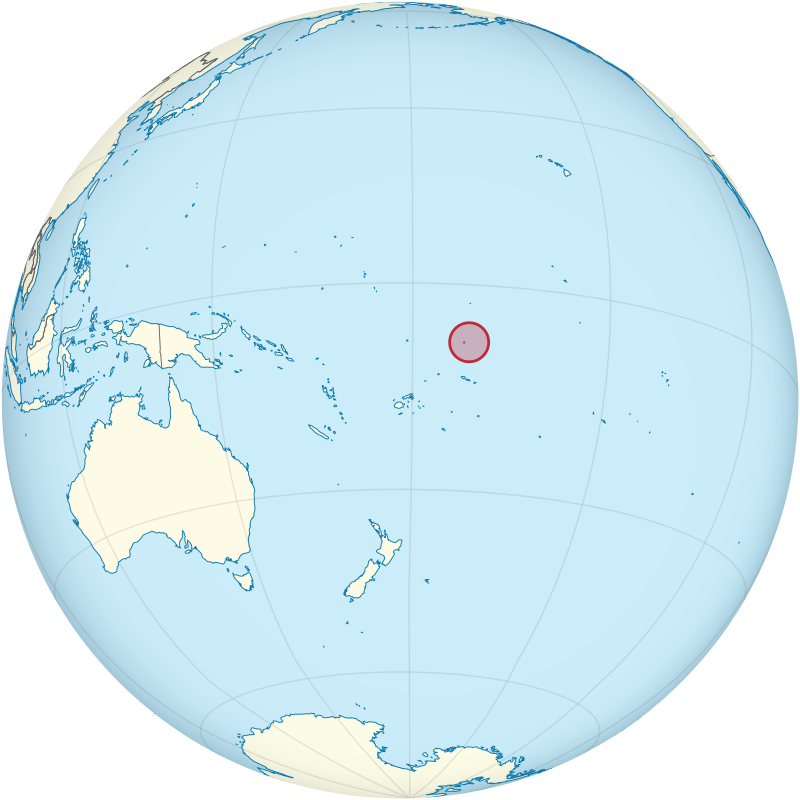
Tokelau is an island country and dependent territory of New Zealand in the southern Pacific Ocean. It lies north of the Samoan Islands, east of Tuvalu, south of the Phoenix Islands, southwest of the Line Islands, and northwest of the Cook Islands. Living on a non-self-governing colonial territory, the people of Tokelau have drafted a constitution and are working toward the status of free association with New Zealand, following the example of such former territories as the Cook Islands and Niue.

Tokelau consists of three tropical coral atolls – Atafu, Nukunonu, and Fakaofo. The capital rotates yearly between them.
Historically, Tokelauan society was ruled by clans. Each atoll was independent until the 18th century when Fakaofo conquered Atafu and Nukunonu and united the three atolls. Inhabitants lived a subsistence lifestyle, relying on fish and coconuts for sustenance.

Atafu, Nukunonu, and Fakaofo are administered by New Zealand; Olohega is currently administered by the United States as part of American Samoa. However, historically, geographically and culturally Olohega (officially referred to as Swains Island) is part of Tokelau and remains a subject to an ongoing territorial dispute. These four atolls of Tokelau – Atafu, Fakaofo, Nukunonu, and Olohega – are represented on Tokelau's unofficial flag as four stars.

Each of the atolls is small rings of land which surround crystalline lagoons. Atafu is the smallest of the three islands, home to fishermen and craftsmen. Nukunonu is the largest atoll and the most easily accessible to tourists as there are a resort and a couple of hotels to indulge in. Fakaofo’s claim to fame is its notorious fishing pigs, playful creatures that swim between the small islets to forage and shelter, snatching up morsels as they swim by.
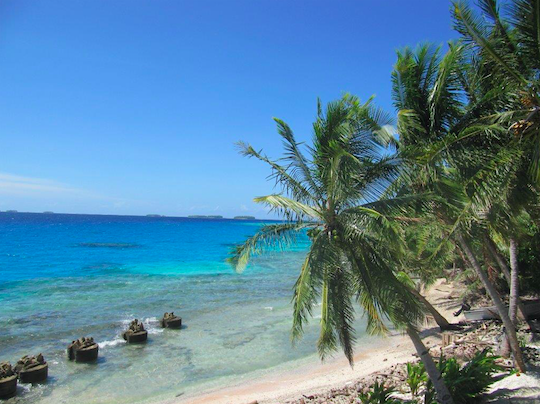
The name Tokelau is a Polynesian word meaning 'north wind'. At first, the islands were named the Union Islands and Union Group by European explorers. In 1946 Tokelau Islands was adopted as the name, and was contracted to Tokelau on 9 December 1976.

Archaeological evidence indicates that people have lived on the atolls of Tokelau approximately for 1,000 years – remnants of older settlements are found mostly in the sites of current settlements. Inhabitants developed forms of music and art. The three atolls functioned largely independently while maintaining social and linguistic cohesion. Tokelauan society was governed by clans. Prior to the arrival of Christianity, Tokelauans worshipped a god called Tui Tokelau, along with the usual pantheon of Polynesian gods. In Fakaofo village, there was a 5.5-mitre tall coral slab which personified primary deity Tui Tokelau. It was a centrepiece of yearly festivities. A smaller replica of this monument stands in the meeting house of Fakaofo.
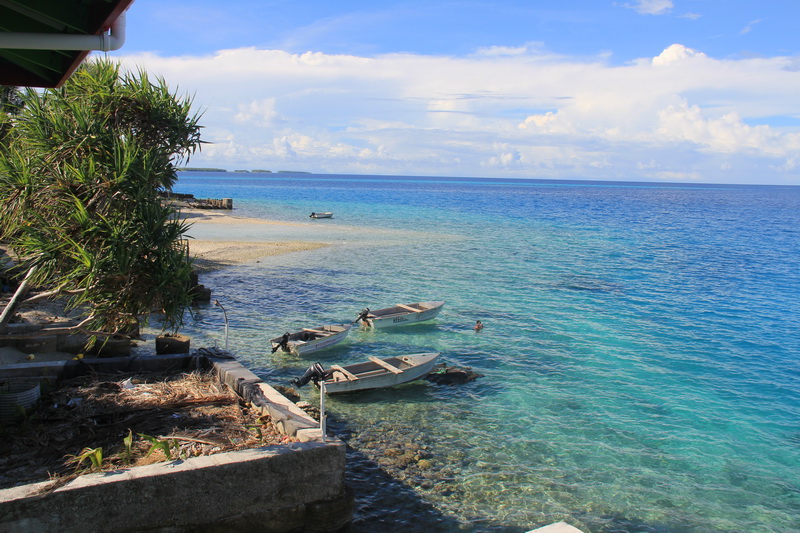
Tokelau has a population of approximately 1,500 people. While slightly more females than males live on Atafu and Fakaofo, males make up 57% of Nukunonu residents. As of the 2016 census, around 45% of residents were born overseas, mostly in Samoa (15.3% of the total population) and New Zealand (11.5%). The country has no minorities. The major religion is the Congregational Christian Church. For approximately 94% of the population, Tokelauan is their first language. English is taught as a second language and is widely understood. All Tokelauans have New Zealand citizenship and 7173 people of Tokelauan descent live in New Zealand (2013 NZ Census).
There is little native fauna on the atolls. Lizards are common. Migratory seabirds visit Tokelau frequently.

Each atoll has one village, squeezed onto its highest island (motu). The three villages are divided territorially into two faitu, which compete against each other in fishing, action songs, dancing, sports and kilikiti (village cricket with up to 50 players per side). Despite increasing incursions made by the outside world, all resources are shared between families according to need. The most obvious features of the three villages are their churches and village hall (fale fono).

The atolls are cramped beyond belief, so individualism and a need for privacy are not a real virtue in Tokelau. Visitors should dress conservatively. Resources are scarce, so picking up fallen coconuts would be wrong. If invited into the home of a local, the guests are expected to remove their shoes on entering and to sit cross-legged.

Tokelau is staunchly Christian, and Sunday is devoted almost entirely to church-going. As many activities (including work) are forbidden on Sunday, it's a good idea for visitors to delay their arrival until Monday. The religious distribution amongst the atolls reflects the staggered arrival of Samoan missionaries in the 19th century: Atafu is almost completely Protestant; Nukunonu is largely Catholic; and Fakaofo is split between the two faiths, due to the simultaneous arrival of Catholic and Protestant missionaries. The divine beauty of Tokelau is expressed through the historical places, precisely, its churches as this land is filled with the Romanian and Catholic churches.
Interdenominational conflict is rare as it runs contrary to the overriding concept of village unity (maopoopo).

Tokelauans are Polynesian, closely related to Tuvaluans, Samoans and Cook Islanders. The sprinkling of European surnames is the legacy of the whalers and beachcombers who visited in the late 19th century; their subsequent intermarriage has led to today's Tokelauans being described as 'an improbably bizarre genetic mixture'.

Tokelauan is a Polynesian language, closely related to Tuvaluan and Samoan. Most people speak some English, thanks to their frequent contact with New Zealand, and it is taught as a second language in Tokelau's schools.

Traditional food such as fish, sweet potato (kumala), breadfruit, taro, pork, and poultry are cooked either on kerosene stoves or the earth oven (umu). The traditional diet is increasingly supplemented with imported junk food and in consequence, the Islanders' health suffers from obesity. There is no fresh water on the atolls. Tank-collected rainwater tastes brackish and thus, 'cold stuff' (i.e. beer) is popular (but strictly rationed on more-traditional Atafu). Kaleva, which is made of fermented coconut sap, is used instead of imported alcohol. It is called 'sour toddy', referring to its taste. In modern-day Tokelau, most food and drink is shipped to the islands, as little can be grown on these coral atolls.

According to the Central Intelligence Agency's list of countries by GDP, Tokelau has the smallest economy of any country in the world, with an annual purchasing power of about US $1,000 (€674) per capita. At the same time, it is a leader in renewable energy, being the first 100% solar powered nation in the world. The first power station was completed in August 2012. Nowadays, three solar power stations provide 100% of current electrical demand from photovoltaics, with battery backup. During periods of prolonged cloud cover, generators run on coconut oil to supply power and simultaneously recharge the battery bank. The systems are designed to withstand winds of 230 km/h. Tokelau is proud to be 'a little nation leading the world'.

Tokelauans are master fishermen and many of the traditional methods for fishing are still a common practice. Although modern boats are available, the traditional canoe is still the favourite choice of a raft, due to its flexibility and manoeuvring when fishing. Atafu is the only island that still builds traditional canoes.

Until December 2011, Tokelau was 11 hours behind Coordinated Universal Time (UTC). At midnight 29 December 2011 Tokelau shifted to UTC +13:00 in response to Samoa's decision to switch sides of the International Dateline. This brought Tokelau closer to New Zealand time. As a result, 30 December 2011 has been skipped.

Tokelau is a free and democratic nation with elections every three years. The basis of Tokelau’s legislative, administrative and judicial systems is the Tokelau Islands Act 1948, which has been amended on a number of occasions. Since 1993 the territory has annually elected its own head of government, the Ulu-o-Tokelau. Previously the Administrator of Tokelau was the highest official in the government and the territory was administered directly by a New Zealand government department.

English Vice-Admiral John Byron discovered Atafu on 24 June 1765 and named it ‘Duke of York’s Island’. Parties onshore reported that there were no signs of current or previous inhabitants.
Captain Edward Edwards, aware of Byron's discovery, visited Atafu on 6 June 1791 while searching for mutineers from the HMS Bounty. There were no permanent inhabitants but he found houses equipped with canoes and fishing gear and suggested that the island was used by fishermen as a temporary residence. On 12 June 1791 Edwards sailed southward and discovered Nukunonu, naming it 'Duke of Clarence's Island'.

On 14 February 1835 Captain Smith of the United States whaling ship General Jackson reached the island of Fakaofo, calling it D’Wolf’s Island.
On 25 January 1841, the United States Exploring Expedition visited Atafu and discovered a small population living on the island. The expedition reached Nukunonu on 28 January 1841 but did not record any information about inhabitants. On 29 January 1841, the expedition discovered Fakaofo and named it Bowditch. The Islanders were found to be similar in appearance and nature to those in Atafu.

Contact with Europeans led to some significant changes in Tokelauan society. Trading ships brought new food, cloth, and materials. Missionaries preached Christianity in Tokelau from 1845 to the 1860s. They used native teachers to convert the Tokelauans. Christianity was readily embraced by locals. Atafu was converted to Protestantism by the London Missionary Society, Nukunonu was converted to Catholicism, and Fakaofo was converted to both denominations.
Though Tokelauans are Polynesian, some have European names, a result of visits by whalers and European explorers in the late 19th century.

Tokelau became a British protectorate in 1877; the status was formalised in 1889. In 1916 the British Government annexed the atolls, renamed them into the Union Islands, and included them within the boundaries of Kiribati and Tuvalu. In 1926 Britain passed administration of Tokelau to New Zealand.
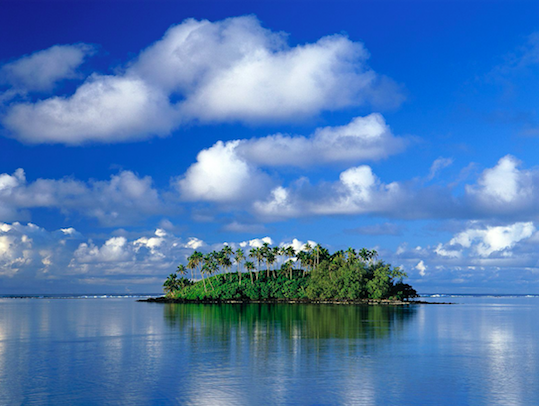
Between 1856 and 1979 the United States claimed that it held sovereignty over the island and the other Tokelauan atolls. In 1979 the US conceded that Tokelau was under New Zealand sovereignty, and a maritime boundary between Tokelau and American Samoa was established by the Treaty of Tokehega. While Tokelau was declared to be part of New Zealand from 1 January 1949, it has a distinctive culture and its own political, legal, social, judicial, and economic systems.
Since 1996 Tokelau has a legislative body, called the General Fono council, which deals with national issues. As a territory, Tokelau has had an Administrator appointed by the New Zealand Minister for Foreign Affairs; however, in 2004 the Administrator delegated his powers to the three Village Councils.
In addition, every three years, a Village Head is elected. Daily activities in the villages are managed by elected mayors. New Zealand statutory laws do not apply to Tokelau except when they are expressly extended to the territory.

In earlier times Tokelauans depended on the native pandanus and coconut trees for food. Later they got accustomed to introduced plants such as swamp taro, which they grew in ponds dug down to the freshwater level, and breadfruit. Marine resources were also vital. Tokelau people have developed a unique system of sharing out food among all members of the community. This system is called inati.

Cyclone Percy struck and severely damaged Tokelau in late February and early March 2005, destroying roads and bridges and disrupting electric power and telecommunication systems. The cyclone spoilt vast quantities of food crops including bananas, coconuts, and pandanus. No one has been seriously injured but villagers lost a significant amount of property.
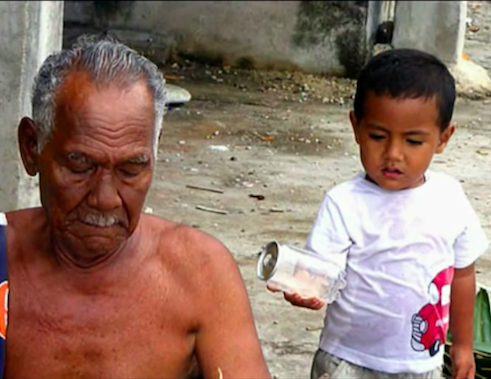
The geographic future of Tokelau depends on the height of the ocean. No significant land is more than two metres above high water of ordinary tides. This means Tokelau is vulnerable to any possible sea level rises caused by global warming. On the frontline of climate change, Tokelauans' means of livelihood are diminishing daily. Though their first choice is to remain in their home country, many had been forced to migrate as the migration to Samoa and New Zealand were their only option. Tokelauans are not only climate refugees. Studies show that there are currently about 25 million people around the world who have been displaced due to climate change — a number that could potentially rise to 250 million by 2050.

Tokelau currently has no air transportation. The only means of transport is by ship from Samoa. The government-run MV Tokelau provides passenger and cargo services to and from Apia (Samoa) every two weeks. The trip takes about 24-36 hours each way, and the ship makes the round trip in five days. Passengers must bring their own mattresses to sleep on. Food is provided, and there is one bathroom for the passengers. Since there is no harbour in Tokelau, launches are used to embark and disembark.
There is also a larger ship that makes the trip once a month. The only other ways to get to Tokelau are by private boat or private helicopter.
There is one hotel in Tokelau, the Luana Liki, located on Nukunonu. There is one resort, Fale Fa, also located on Nukunonu. There is a guest house on Atafu, the Feliti Lopa. The distances around the atolls are short, so a visitor can walk within an atoll. It is hard to get lost while on a stroll. Tourists can enjoy travelling between atolls on a dinghy or traditional outrigger canoe.

In 2006 and 2007 Tokelauans held referenda to decide whether to move to self-government in free association with New Zealand. In both referenda, the citizens failed to achieve the required two-thirds majority.
Tokelau is a full or associate member of many international organisations, including South Pacific Regional Environmental Programme, the Forum Fisheries Agency, the World Health Organization, and UN Educational Scientific and Cultural Organisation (UNESCO).
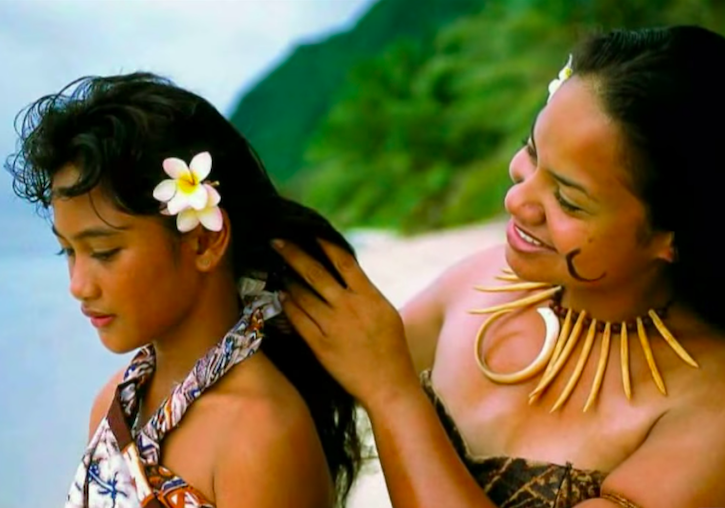
 In 2005 the legislature of the Tokelau islands announced a contest for a territorial anthem. The selection process took four years, and the entry of local musician Eric Lemuelu Falima was selected as the winner. After the selection, the words were debated and revised until March 2012, when the anthem was adopted. ‘Te Atua o Tokelau’ or ‘Tokelau mo te Atua’ is the anthem of Tokelau. The last line of the anthem is only to be spoken, not sung: “The god of Tokelau, the god of villages, the god of Tokelau, do bless Tokelau. Carefully tend the peaceful into My land, your custom, your flag that's waving of one mind, stand firm as a foundation, Tokelau for the God, the God of Tokelau”.
In 2005 the legislature of the Tokelau islands announced a contest for a territorial anthem. The selection process took four years, and the entry of local musician Eric Lemuelu Falima was selected as the winner. After the selection, the words were debated and revised until March 2012, when the anthem was adopted. ‘Te Atua o Tokelau’ or ‘Tokelau mo te Atua’ is the anthem of Tokelau. The last line of the anthem is only to be spoken, not sung: “The god of Tokelau, the god of villages, the god of Tokelau, do bless Tokelau. Carefully tend the peaceful into My land, your custom, your flag that's waving of one mind, stand firm as a foundation, Tokelau for the God, the God of Tokelau”.
Traditional Tokelauan music starts with choral elements and adds percussion with log drums, wooden boxes, and biscuit tins. A Tokelauan music group Te Vaka ('the Canoe') has brought Tokelauan music and dance to international destinations. It was founded by Grammy-nominated composer and songwriter on Disney's 'Moana', Opetaia Foa’i. His daughter Olivia has captivated audiences all over the world with her voice and Contemporary Pacific moves. These days Te Vaka is viewed as the ambassador for the South Pacific as the group has performed at many major sporting events including the Beijing and London Olympics, the Rugby World Cup in Paris and the Commonwealth Games in Melbourne.

